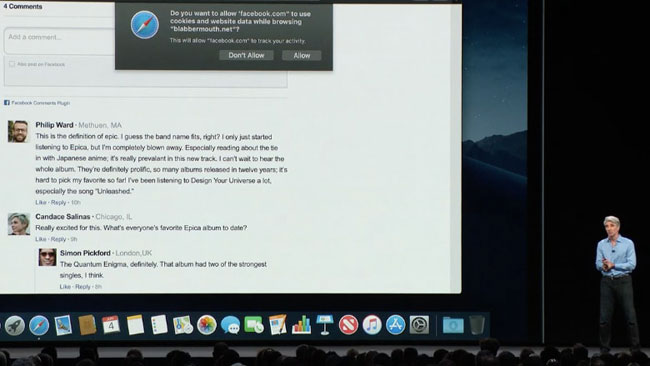Apple joins the war on Facebook over privacy
June 8, 2018 01:48 pm
The eyes of the tech world were on Apple this week - until Facebook’s latest privacy crisis subsumed everything.
Thousands of software developers flocked to San Jose, California for Apple’s annual Worldwide Developers Conference. But even at WWDC, with Apple on the brink of becoming history’s first trillion dollar company, Facebook and privacy were inescapable.
Among the many announcements made this week by Apple were new measures designed to protect privacy, including features in the Safari browser that will block ad-tech companies from tracking users, building detailed profiles of them, and serving them creepy ads as they surf the internet.
Even social media sharing buttons and comment fields on other websites can be used by these companies to collect data, Apple claimed. “We’re shutting that down,” Craig Federighi, the company’s top software engineer said to cheers at the conference.
But it was the example Apple chose to use in its presentation of a site known to engage in that behaviour that really caught people’s attention: Facebook.com.
Privacy has become a major concern for regulators and politicians who are increasingly sceptical towards big tech companies. But Apple’s presentation also shows it is now arguably the biggest ideological battleground within the tech industry.
Its actions came just as Facebook lurched into another privacy-related crisis this week, one which could conceivably be even more damaging to it than the Cambridge Analytica debacle which dominated headlines earlier this year.
The New York Times reported that Facebook had struck data sharing arrangements with handset makers that would allow them to access data of Facebook users (and their friends) without their permission.
Facebook denies the substance of the report, but confirmed the existence of limited data partnerships with manufacturers, including with Chinese handset maker Huawei.
Huawei, of course, is the secretive and controversial Chinese telco equipment and handset maker which has been locked out of the US market due to security concerns, and banned from Australia’s National Broadband Network, for similar reasons.
It has added geopolitical fuel to an already raging privacy fire. There are calls for Facebook CEO Mark Zuckerberg to be hauled before Australia’s parliament to address the issue. Yesterday, Prime Minister Malcolm Turnbull signalled he’d support these calls. Politicians in the US, where China is an equally (if not even more) charged issue are likely to make similar noises.
Facebook is already being investigated by Australia’s Privacy Commissioner over the Cambridge Analytica scandal, which affected up to 310,000 Australians. (And, together with Google, it is also the focus of an ACCC enquiry into digital platforms).
Not only is it being investigated by governments around the world, it now has the world’s most valuable company throwing shade at it.
Apple was also among the handset makers named in the original New York Times report, but it has denied seeking any data from Facebook (and Facebook said the arrangements were tightly controlled and not abused by anyone involved, anyway).
The iPhone maker has espoused an unwavering commitment to privacy throughout its existence - to the extent that it was once in a bitter dispute with the FBI over encryption.
In media interviews this week Apple CEO Tim Cook talked up his company’s privacy credentials, and his disdain for the cavalier approach of other tech companies (i.e Facebook and Google) on data collection was unmistakeable.
Apple doesn’t meaningfully compete with Facebook, although once tech companies get to a certain size they are all potential rivals (for talent, at the very least).
That Apple took a public stand against Facebook shows it knows privacy issues are important to its users. And critical for its business.
On the other hand, data collection is absolutely critical to Facebook, so its an impasse that won’t be easily resolved.
Apple hasn’t been afraid to publicly criticise rival tech companies in the past.
Steve Jobs’ contempt for Google in general, and towards Adobe (for its Flash software) was legendary. He also had a complicated love-hate rivalry with Microsoft.
Yet, under the measured leadership of Cook, the company has stayed largely above the fray. Until this week. And that is hugely significant.
Source: The Sydney Morning Herald











